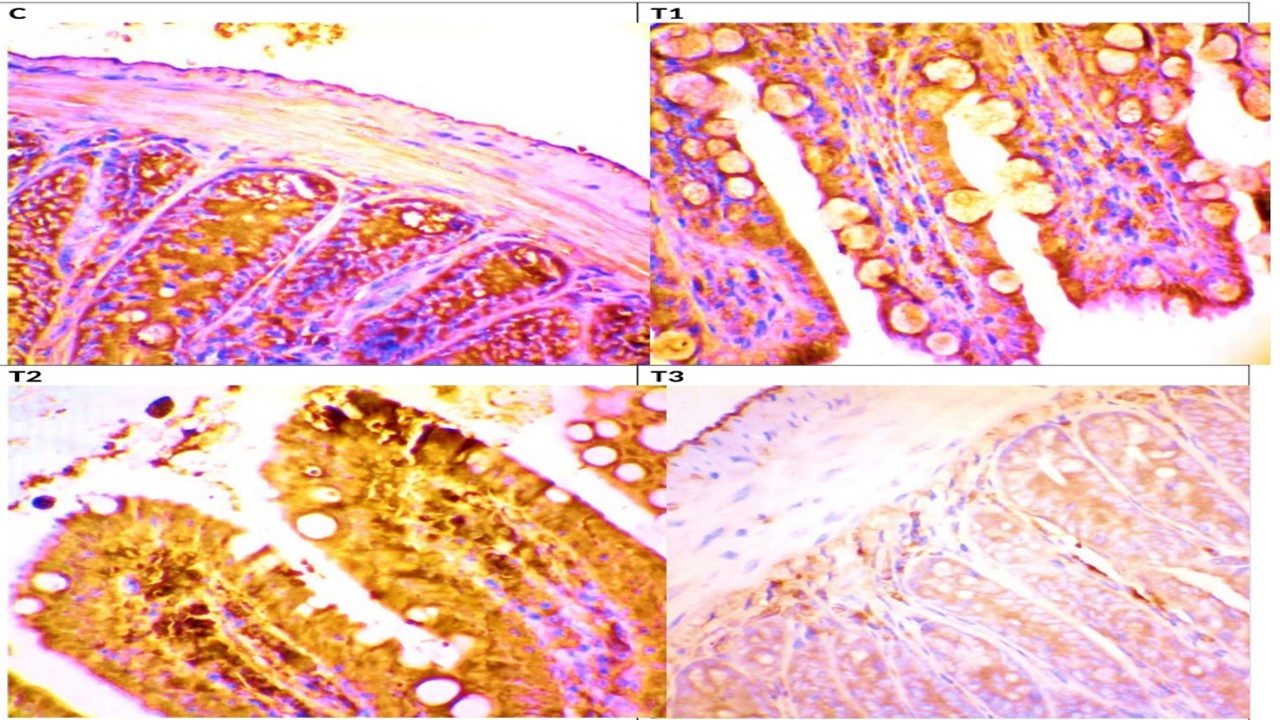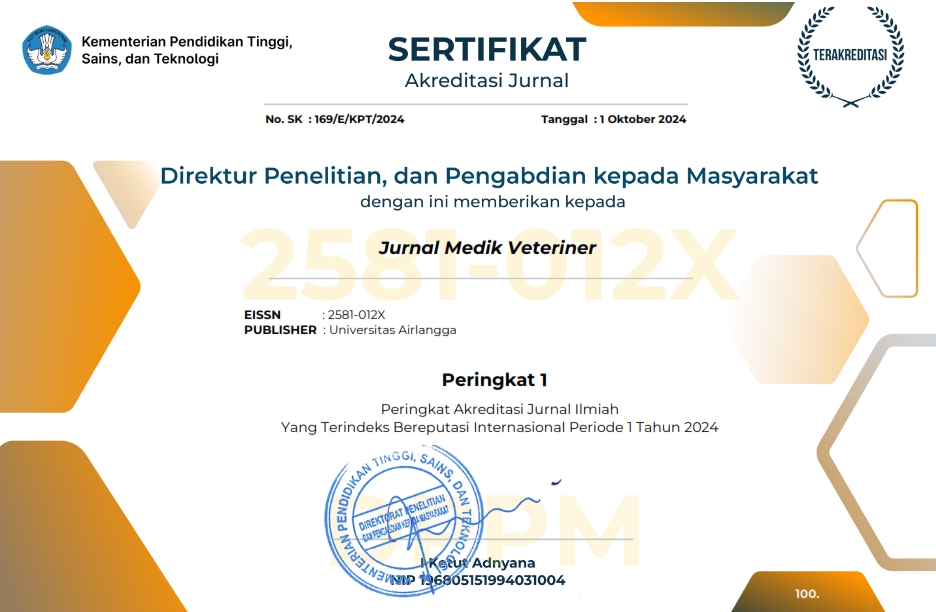Effects of Colostrum Probiotics on ACE-2 Expression and Hematology in Murine Models Immunized Against Canine Coronavirus

Downloads
In modern society, the human-animal bond has significantly strengthened, with pets evolving into integral family members providing psychological support to their owners. In the current landscape of heightened focus on immune health and the widespread utilization of probiotic advancements globally, this study investigates the potential of colostrum probiotics to influence hematological profiles and ACE-2 expression in a murine model of canine coronavirus (CCV) infection. Twenty-four mice were categorized into four treatment groups: (C) placebo, (T1) CCV induction + isoprinosine, (T2) CCV induction + probiotic-based, and (T3) CCV induction + colostrum-based probiotics. CCV induction was performed via subcutaneous injection of a live-attenuated CCV vaccine at 60 mg/kg body weight for 7 consecutive days. Probiotics were administered via oral gavage for 14 consecutive days. On the 15th day post-treatment, euthanasia was performed, and blood samples were collected to examine hematological profiles and ACE-2 enzymes in the intestinal tissue sections. Data analysis, conducted using ANOVA followed by Duncan's test (p < 0.05), revealed a significant improvement in the T3 group, particularly in leukocytes, hemoglobin, lymphocytes, neutrophils, and ACE-2 expression. In conclusion, this study suggests that probiotics, specifically colostrum-based, enhance immune parameters and ACE-2 expression in the intestinal milieu of murine model subjected to CCV immunization.
Abdurrahman, F., Soeharsono, S., & Soepranianondo, K. (2022). Study of performance index and business analysis on chicken infected by Escherichia coli with probiotic provision of lactic acid bacteria. Jurnal Medik Veteriner, 5(1), 74–80.
Al-Sheraji, S. H., Ismail, A., Manap, M. Y., Mustafa, S., Yusof, R. M., & Hassan, F. A. (2013). Prebiotics as functional foods: A review. Journal of Functional Foods, 5(4), 1542–1553.
Banu, N., Panikar, S. S., Leal, L. R., & Leal, A. R. (2020). Protective role of ACE2 and its downregulation in SARS-CoV-2 infection leading to Macrophage Activation Syndrome: Therapeutic implications. Life Sciences, 256, 117905.
Beaumier, A., Rush, J. E., Yang, V. K., & Freeman, L. M. (2018). Clinical findings and survival time in dogs with advanced heart failure. Journal of Veterinary Internal Medicine, 32(3), 944–950.
Berlina, C. R., Hidanah, S., Al-Arif, M. A., Luqman, E. M., Yuniarti, W. M., & Mufasirin, M. (2023). Efficacy of lactic acid bacteria probiotics on feed efficiency and carcass weight in Kampung Unggul Balitbangtan (KUB) chicken. Jurnal Medik Veteriner, 6(3), 427–432.
Chandra, E. H., Lokapirnasari, W. P., Hidanah, S., Al-Arif, M. A., Yuniarti, W. M., & Luqman, E. M. (2022). Probiotic potential of lactic acid bacteria on feed efficiency, weight and carcass percentage in ducks. Jurnal Medik Veteriner, 5(1), 69–73.
Dang, Y., Sun, Y., Zhou, Y., Men, X., Wang, B., Li, B., & Ren, Y. (2022). Effects of probiotics on growth, the toll-like receptor-mediated immune response and susceptibility to Aeromonas salmonicida infection in rainbow trout Oncorhynchus mykiss. Aquaculture, 738668.
De Oliveira, E. P., & Burini, R. C. (2009). The impact of physical exercise on the gastrointestinal tract. Current Opinion in Clinical Nutrition & Metabolic Care, 12(5), 533–538.
Faiqoh, B. E., Lamid, M., Damayanti, R., Chusniati, S., Al-Arif, M. A., Warsito, S. H., Hussain, M. A. (2023). Effect of probiotic administration of Bacillus subtilis and Bacillus coagulans isolate on growth performance in broiler chicken. Jurnal Medik Veteriner, 6(3), 99–106.
Gibson, G. R. (2004). From probiotics to prebiotics and a healthy digestive system. Journal of Food Science, 69(5), M141–M143.
Hamid, I. S., & Fikri, F. (2021). Improvement of feed processing skills using probiotics in Glondok and Panggang Village communities, Banyuwangi. Jurnal Medik Veteriner, 4(1), 170–174.
Hamid, I. S., Aksono, E. B., Sukmanadi, M., & Purnama, M. T. E. (2018). Antiangiogenesis activity test of the tin leaf (Ficus carica L.) on the number of blood vessels and VEGF expression of the chorioallantoic membrane of embryonated chicken eggs. European Journal of Oncology Pharmacy, 1(4), e00007.
Hamid, I. S., Ekowati, J., Solfaine, R., Chhetri, S., & Purnama, M. T. E. (2022). Efficacy of probiotic on duodenal TNF-α expression and the histological findings in the liver and lung in animal model canine coronavirus. Pharmacognosy Journal, 14(3), 591–597.
Hoarau, C., Lagaraine, C., Martin, L., Velge-Roussel, F., & Lebranchu, Y. (2006). The supernatant of Bifidobacterium breve induces dendritic cell maturation, activation, and survival through a Toll-like receptor 2 pathway. Journal of Allergy and Clinical Immunology, 117(3), 696–702.
Khattab, E. S., Ragab, A., Abol-Ftouh, M. A., & Elhenawy, A. A. (2022). Therapeutic strategies for Covid-19 based on molecular docking and dynamic studies of the ACE-2 receptors, Furin, and viral spike proteins. Journal of Biomolecular Structure and Dynamics, 40(23), 13291–13309.
Kirana, A. L. P., Lovela, A. R., Lokapirnasari, W. P., Al-Arif, M. A., Hidanah, S., Warsito, S. H., & Ardianto, A. (2024). Efficacy of probiotics on nutrient intake and egg weight in Japanese quail (Coturnix coturnix japonica). Jurnal Medik Veteriner, 7(2), 228–234.
Lescheid, D. W. (2014). Probiotics as regulators of inflammation: A review. Functional Foods in Health and Disease, 4(7), 299–311.
Lokapirnasari, W. P., Al-Arif, M. A., Maslachah, L., Chandra, E. H., Utomo, G. S. M., & Yulianto, A. B. (2022). Effect of combination of probiotics and Moringa oleifera leaf extract on nutrients intake in ducks. Jurnal Medik Veteriner, 5(2), 241–246.
Manichanh, C., Borruel, N., Casellas, F., & Guarner, F. (2012). The gut microbiota in IBD. Nature Reviews Gastroenterology & Hepatology, 9(10), 599–608.
Marteau, P., Seksik, P., Lepage, P., & Doré, J. (2004). Cellular and physiological effects of probiotics and prebiotics. Mini Reviews in Medicinal Chemistry, 4(8), 889–896.
Meijer, K., de Vos, P., & Priebe, M. G. (2010). Butyrate and other short-chain fatty acids as modulators of immunity: what relevance for health? Current Opinion in Clinical Nutrition & Metabolic Care, 13(6), 715–721.
Mileti, E., Matteoli, G., Iliev, I. D., & Rescigno, M. (2009). Comparison of the immunomodulatory properties of three probiotic strains of Lactobacilli using complex culture systems: prediction for in vivo efficacy. PLOS ONE, 4(9), e7056.
Munford, R. S. (2008). Sensing gram-negative bacterial lipopolysaccharides: a human disease determinant? Infection and Immunity, 76(2), 454–465.
Noli, C., & Saridomichelakis, M. N. (2014). An update on the diagnosis and treatment of canine leishmaniosis caused by Leishmania infantum (syn. L. chagasi). The Veterinary Journal, 202(3), 425–435.
Pachana, N. A., Massavelli, B. M., & Robleda-Gomez, S. (2011). A developmental psychological perspective on the human–animal bond. The Psychology of The Human-Animal Bond: A Resource for Clinicians and Researchers, 151–165.
Pradere, J. P., Troeger, J. S., Dapito, D. H., Mencin, A. A., & Schwabe, R. F. (2010). Toll-like receptor 4 and hepatic fibrogenesis. Seminars in Liver Disease, 30(3), 232–244.
Pratama, H. S., Lokapirnasari, W. P., Soeharsono, S., Al-Arif, M. A., Harijani, N., & Hidanah, S. (2021). Effect of probiotics Bacillus subtilis on feed efficiency and egg mass of laying hens. Jurnal Medik Veteriner, 4(1), 37–41.
Purnama, M. T. E., Dewi, W. K., Triana, N. M., & Ooi, H. K. (2021). Serum liver enzyme profile in Timor deer (Cervus timorensis) with fascioliasis in Indonesia. Tropical Biomedicine, 38(1), 57–61.
Semova, I., Carten, J. D., Stombaugh, J., Mackey, L. C., Knight, R., Farber, S. A., & Rawls, J. F. (2012). Microbiota regulates intestinal absorption and metabolism of fatty acids in the zebrafish. Cell Host & Microbe, 12(3), 277–288.
Solfaine, R., Fikri, F., Maslamama, S. T., Purnama, M. T. E., & Hamid, I. S. (2024). Exploring the protective efficacy of Lactobacillus acidophilus against interleukin-1beta (IL-1β) expression in mice induced with canine coronavirus vaccine. Advances in Animal and Veterinary Sciences, 12(4), 673–678.
Utomo, G. S. M., Hidanah, S., Al-Arif, M. A., Lokapirnasari, W. P., & Yuniarti, W. M. (2022). Business analysis of probiotic administration of lactic acid bacteria on the performance of Kampung Super chicken. Jurnal Medik Veteriner, 5(1), 87–93.
Wardiana, N. I., Lokapirnasari, W. P., Harijani, N., Al-Arif, M. A., & Ardianto, A. (2021). Bacillus subtilis probiotics in chicken feed improve egg quality with differences in shelf life. Jurnal Medik Veteriner, 4(1), 8–13.
Zapolska-Downar, D., Siennicka, A., Kaczmarczyk, M., Kołodziej, B., & Naruszewicz, M. (2004). Butyrate inhibits cytokine-induced VCAM-1 and ICAM-1 expression in cultured endothelial cells: the role of NF-κB and PPARα. The Journal of Nutritional Biochemistry, 15(4), 220–228.
Copyright (c) 2025 Iwan Sahrial Hamid, Rondius Solfaine, Supriyadi Supriyadi

This work is licensed under a Creative Commons Attribution-NonCommercial-ShareAlike 4.0 International License.
Authors who publish in this journal agree to the following terms:
1. The journal allows the author to hold the copyright of the article without restrictions;
2. The journal allows the author(s) to retain publishing rights without restrictions;
3. The legal formal aspect of journal publication accessibility refers to Creative Commons Attribution-NonCommercial-ShareAlike 4.0 International License (CC BY-NC-SA).






11.jpg)




















